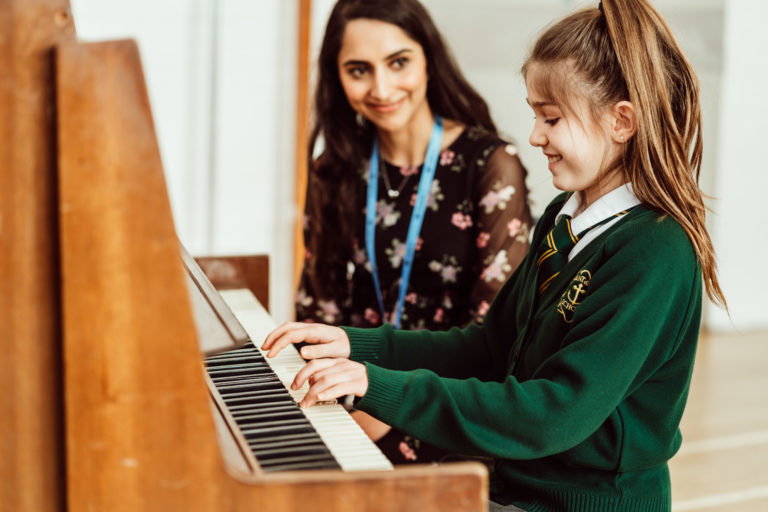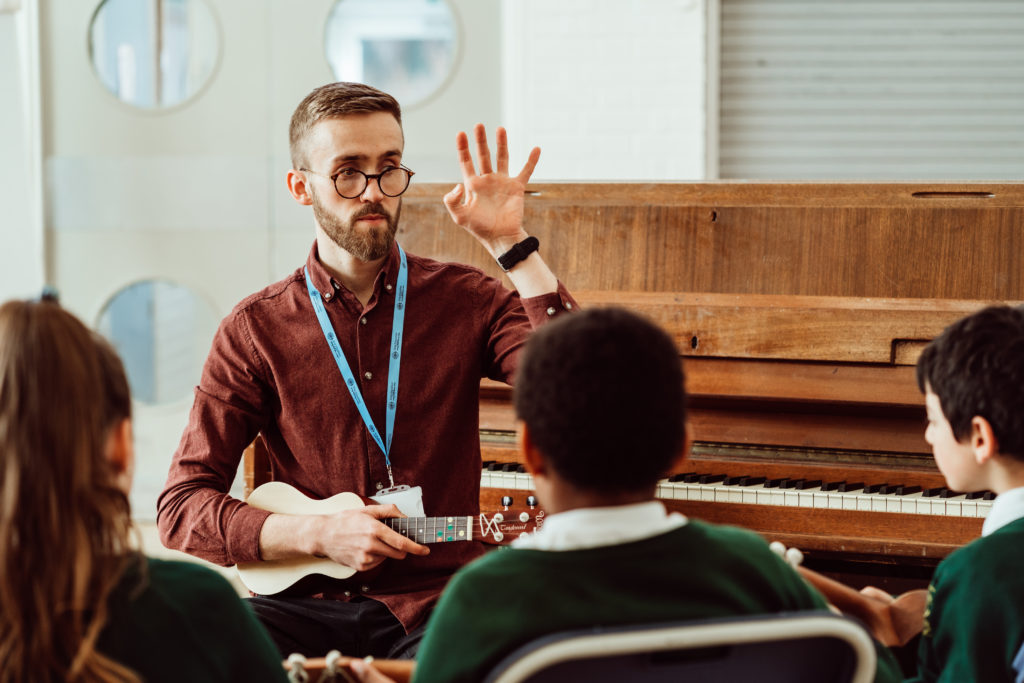
Sing Education bring our unique brand of high-energy, active making to instrumental lessons. Our high-calibre music specialists incorporate games, props and performance opportunities into the learning. Whether in group sessions or one-to-one, the focus is on fostering a deep understanding and love of music – valuing enjoyment, enthusiasm and progression over perfect notes or strict adherence to scores.


Ukulele or guitar?
Recorder or flute?
Keyboard, violin or voice?
When it comes to small group and 1:1 music tuition with Sing Education, there are so many choices.
And all of them good!
Instrumental music – whether taught in a small group or 1:1 setting – is the perfect complement to classroom tuition for primary school pupils.
Extracurricular learning opportunities like these help shape well-rounded young musicians – creating natural leaders within the classroom setting, enabling deeper explorations of technique and musicality and giving confidence to progress through music examinations and into Key Stage 3 learning.
Speaking of senior school, did you know that long before pupils are ready to audition for the National Youth Orchestras or to apply in Year 13 to one of the UK’s leading music conservatoires, instrumental music has already paid valuable dividends?
“There’s little doubt that learning to play a musical instrument is great for developing brains.
Science has shown that when children learn to play music, their brains begin to hear and process sounds that they couldn’t otherwise hear. This helps them develop “neurophysiological distinction” between certain sounds that can aid in literacy, which can translate into improved academic results for kids.” TIM
Small group and 1:1 instrumental music lessons deliver the same benefits as curricular and whole class instrumental tuition – enhanced academic performance, improved wellbeing and mental health, higher aspirations to remain in education.
“Some research has demonstrated how recognition for achievement in music, leading to high levels of self-efficacy, can enhance self-efficacy and self-esteem, which then transfers to motivation for other schoolwork.
For instance, McPherson and O’Neill (2010) found that students who were engaged in learning music reported higher competence beliefs and values and lower task difficulty across all school subjects in comparison with those not engaged in making music.
Overall, having experience of learning to play an instrument or sing enhanced motivation for other school subjects.” POW

Focusing on high-energy, active music making, Sing Education instrumental teachers draw heavily upon our general curricular teaching approach – lessons employ singing games, props and flash cards, folk-based material and are singing-led.
A typical lesson is usually 30 minutes long. They feature either a small group session with up to six children or a one-to-one session with one child. Lessons are usually taught in a smaller music room within the school and lessons take place during the school day on the school sites.
In terms of instruments, Sing Education offer a variety of percussive, string and wind tuition choices. These currently include ukelele, keyboard, violin, flute, recorder, guitar and singing.
Each school has a tailored offering which allows them to provide a cohesive , well-rounded music programme, as well as to be able to structure appropriate learner progression within their instrumental offering.
Help your child choose wisely.
Discuss their motivations and aspirations for taking up an instrument. Look at factors such as size, shape and weight of instruments – decide what fits best with their school and home routines. And lastly, encourage their sense of adventure and exploration – what music do they like to listen to? What musical artists do they admire?
“Music tuition can go wrong quickly when the wrong instrument is chosen. One study suggests if children select the right instrument (determined by simple aptitude tests and a preference for the sound of the instrument) they will keep on with lessons longer.
The choice of instrument can depend on the child’s preference, a parent’s suggestion or the availability of the instrument. Parents should take advice and, where possible, rent an instrument prior to making a financial commitment.“ CONV
Without a doubt, parents play a tremendously impactful role in guiding and supporting their child’s overall education. This fact is no more evident than when it comes to instrumental music tuition.
Here are four important steps you can take to help your youngster successfully connect with their instrumental learning:
“Researchers in a 2009 UK study suggested the dramatic drop in music tuition after age 11 was linked to children starting high school.
The study also revealed the main reasons for children ending music lessons were boring lessons, frustration at a lack of progress, disliking practice and competition from other activities. Some children regretted stopping music lessons.
Stopping as soon as a child experiences difficulty or expresses frustration denies that child the benefits of music and reinforces the message that, if something is hard, it’s not worth doing. But continuing lessons for someone who has come to resent them is futile.” CONV


Ready to take the next step? We’ve got plenty of video tutorials and FAQs online to walk you through the nuts and bolts of the enrollment process.
But to jumpstart your process, here is an overview of the six easy steps to enrolling your child in instrumental lessons:
“Going through new registration sign ups, it gives me great satisfaction when we are able to enrol a new child into the schedule, knowing the benefit they will receive from learning a musical instrument. It’s not just a slogan – I really believe music is transformational and that every child deserves music enrichment in their lives.”
> Bert Routledge, Director of 1:1 and small group provision
Founded in 2014 and serving more than 16,000 children each week, Sing Education is a first class provider of primary school music education. Focusing on high-quality, singing-led tuition, we deliver a complete solution for schools which includes teacher recruitment, training and management, bespoke curricular resources and educational consultancy services.
Through music lessons, singing assemblies, choirs, after school clubs and instrumental tuition, Sing Education works with students from Nursery right through to Year 6. Our core philosophy is that “Every Child Has A Voice,” and, as educators active in the classroom, our directors and teachers know firsthand how much young learners benefit from exciting, rewarding music education.
Sing Education currently partners with schools throughout Greater London and Kent, as well as Yorkshire and the Humber.
Not yet on the list? Please enquire about our expansion plans for additional areas we will serve during the 2023-24 academic year.
#SingEducation #PrimarySchoolMusicEducation #EveryChildHasAVoice
Before you let your child quit music lessons, try these 5 things The Conversation CONV



